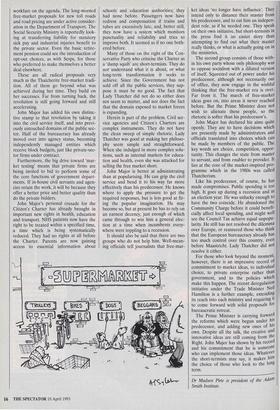MORE THATCHERITE THAN THATCHER
Madsen Pink, head of a free-market
think-tank, argues that John Major's record is above criticism
THE SPECTATOR has not been slow to criticise the Prime Minister. Indeed, it does so stridently and at length. It is perhaps time to redress the balance by pointing out the short-term focus of much of this criti- cism. The short-termism of Britain's invest- ment fund managers is well known. Less noted, but no less real, is the short-termism of political commentators. It manifests itself in a tendency to write off whatever and whoever fails to bring instant results. They talked of Margaret Thatcher's immi- nent political demise during her 1981 trou- bles, when little seemed to be being achieved. Now they are inclined to dismiss John Major. THE SPECTATOR has not been slow to criticise the Prime Minister. Indeed, it does so stridently and at length. It is perhaps time to redress the balance by pointing out the short-term focus of much of this criti- cism. The short-termism of Britain's invest- ment fund managers is well known. Less noted, but no less real, is the short-termism of political commentators. It manifests itself in a tendency to write off whatever and whoever fails to bring instant results. They talked of Margaret Thatcher's immi- nent political demise during her 1981 trou- bles, when little seemed to be being achieved. Now they are inclined to dismiss John Major.
It is upsetting to see some of those who were ardent supporters of Lady Thatcher share in this premature judgment. In terms of the aims of Mrs Thatcher's governments, John Major is achieving those objectives no less well than she did. If Thatcherism denotes a set of principles translated into policies, John Major is arguably more Thatcherite than she was. Many of those who supported his leadership bid hoped he would take the free-market agenda further than she did. He has certainly done so.
The 1992 Conservative manifesto was at least as radical as those on which Lady Thatcher fought and won her election vic- tories, and the Prime Minister shows every sign of keeping those promises. The pri- vatisation of British Rail, with access for private competitors, is making its way through Parliament. The coalmines are set for privatisation, despite Michael Hesel- tine's ill-timed attempt to close them. Dur- ing the Thatcher years, these two industries were reckoned to be the most difficult to -privatise, and her governments never attempted either, despite promises to do so.
The Royal Mail, which Lady Thatcher sentimentally thought to be 'different', is being treated the same, and is headed for both competition and the private sector. Similar survivors of the Thatcher era include NEDC (already gone), the wages councils (going) and the infamous closed shop for student unions (about to go). Whatever else this might be called, it can hardly be• characterised as 'going back on Thatcherisnf.
The Government is gearing up for anoth- er attempt to liberalise Sunday shopping, despite Lady Thatcher's defeat in Parlia- ment on the same issue. The education reforms have been taken a bold step fur- ther, with more opportunities for schools to opt out and for parents to make informed choices.
More radical still are the measures now being canvassed more or less openly under the Portillo review of public spending. John Major's 'something for something' speech at the Carlton Club has put some form of workfare on the agenda. The long-mooted free-market proposals for new toll roads and road pricing are under active consider- ation in the Department of Transport. The Social Security Ministry is reportedly look- ing at transferring liability for statutory sick pay and industrial injuries benefit to the private sector. Even the basic retire- ment pension could see the introduction of opt-out choices, as with Serps, for those who preferred to make themselves a better deal elsewhere.
These are all radical proposals very much in the Thatcherite free-market tradi- tion. All of them go beyond what was achieved during her time. They build on her successes. Far from turning back, the revolution is still going forward and still accelerating.
John Major has added his own distinc- tive stamp to that revolution by taking it into the civil service itself, and into previ- ously untouched domains of the public sec- tor. Half of the bureaucracy has already moved over into agency status, becoming independently managed entities which receive block budgets, just like private-sec- tor firms under contract.
Furthermore, the big drive toward 'mar- ket testing' means that private firms are being invited to bid to perform some of the core functions of government depart- ments. If in-house civil servants and agen- cies retain the work, it will be because they offer a better price and better quality than do the private bidders.
John Major's personal crusade for the Citizen's Charter has already brought in important new rights in health, education and transport. NHS patients now have the right to be treated within a specified time, a time which is being systematically reduced, They had no rights at all before the Charter. Parents are now gaining access to essential information about schools and education authorities; they had none before. Passengers now have redress and compensation if trains and tubes are excessively late, and, better still, they now have a system which monitors punctuality and reliability and tries to improve both. It seemed as if no one both- ered before.
Many of those on the right of the Con- servative Party who criticise the Charter as a 'damp squib' are short-termists. They do not understand what it is about, or what long-term transformation it seeks to achieve. Since the Government has not sold off all the public services, they sup- pose it must be no good. The fact that Lady Thatcher did not do so either does not seem to matter, and nor does the fact that the domain exposed to market forces is expanding.
Herein is part of the problem. Civil ser- vice agencies and Citizen's Charters are complex instruments. They do not have the clean sweep of simple rhetoric. Lady Thatcher was good at making her philoso- phy seem simple and straightforward. When she indulged in more complex solu- tions, such as internal markets for educa- tion and health, even she was attacked for selling the free market short. John Major is better at administrating than at popularising. He can grip the civil service and bend it to his way far more effectively than his predecessor. He knows where to apply the pressure to get the required responses, but is less good at fir- ing the popular imagination. He may become so, but at present he has to rely on an earnest decency, just enough of which came through to win him a general elec- tion at a time when incumbents every- where were toppling to a recession.
It should also be said that there are two groups who do not help him. Well-mean- ing officials tell journalists that free-mar- ket ideas 'no longer have influence'. They intend only to distance their master from his predecessor, and to cut him an indepen- dent role, as if he needed one. They speak on their own initiative, but short-termists in the press find it an easier story than attempting to find out what their master really thinks, or what is actually going on in the ministries.
The second group consists of those with- in his own party whose only philosophy was to oppose socialism with a diluted version of itself. Squeezed out of power under his predecessor, although not necessarily out of office, they now engage in the wishful thinking that the free-market era is over. Far from it. The march of free-market ideas goes on, into areas it never reached before. But the Prime Minister does not wish to alienate these people, so the rhetoric is softer than his predecessor's.
John Major has declared his aims quite openly. They are to have decisions which are presently made by administrators and officials translated into choices which can be made by members of the public. The key words are choice, competition, oppor- tunity. This changes the state from master to servant, and from enabler to provider. It lies at the core of the market-inspired pro- gramme which in the 1980s was called Thatcherism.
Like his predecessor, of course, he has made compromises. Public spending is too high. It goes up during a recession and in an election year. He was unlucky enough to have the two coincide. He abandoned the Community Charge before it could benefi- cially affect local spending, and might well see the Council Tax achieve equal unpopu- larity. He still has not resolved the dilemma over Europe, or reassured those who think that the European bureaucracy already has too much control over this country, even before Maastricht. Lady Thatcher did not resolve it either.
For those who look beyond the moment, however, there is an impressive record of commitment to market ideas, to individual choice, to private enterprise rather than government, and to the policies which make this happen. The recent deregulation initiative under the Trade Minister Neil Hamilton is a further example, extending its reach into each ministry and requiring it to come forward with solid proposals for bureaucratic retreat. The Prime Minister is carrying forward the reforms which were begun under his predecessor, and adding new ones of his own. Despite all the talk, the creative and innovative ideas are still coming from the Right. John Major has shown by his record and his commitment that he is someone who can implement those ideas. Whatever the short-termists may say, it makes hint the choice of those who look to the long term.
Dr Madsen Pine is president of the Adani Smith Institute.



























































 Previous page
Previous page